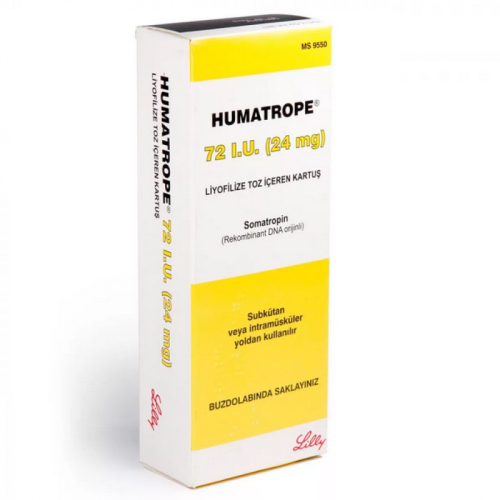Humatrope 72 IU (24MG)
- Brand: Lilly
- Product Code: Humatrope 72 IU (24MG)
- Availability: In Stock
-
$679.00
ACTIVE HALF-LIFE
2.5-3 hours
CLASSIFICATION
Peptide Hormone
DOSAGE
Men 4-10 IU/day
ACNE
No
WATER RETENTION
No
HBR
No
HEPATOTOXICITY
No
AROMATIZATION
No
MANUFACTURER
Lilly
WAREHOUSE
International Warehouse 2
SUBSTANCE
Somatropine - 191 Amino Acid
,
Human Growth Hormone (HGH), also referred to as somatotropin or somatropin, is a peptide hormone that promotes growth, cell reproduction, and regeneration in humans and various animals. It is a specific type of mitogen that targets certain cell types. This hormone consists of a single-chain polypeptide made up of 191 amino acids and is produced, stored, and released by somatotropic cells located in the lateral wings of the anterior pituitary gland. The secretion of HGH is influenced by several factors, including diet and physical activity.
HGH encourages body cells to grow in size and speeds up cell division. It also facilitates the transport of amino acids across cell membranes and enhances the conversion of these molecules into proteins, leading to an anabolic effect (muscle growth) within the body. Additionally, HGH impairs the typical rate at which cells utilize carbohydrates while promoting a heightened use of fats. Research has shown that fat loss and increases in lean mass can occur with HGH doses as low as 0.028 iu/kg daily over a period of 24 weeks. Furthermore, HGH stimulates the production of IGF-1.
In medicine, HGH is used to address growth disorders in children and growth hormone deficiencies in adults. Numerous studies have demonstrated the positive effects of modulating HGH, which include:
Additionally, various studies focusing on individuals with HGH deficiency indicate its significant role in mental and emotional health, as well as maintaining high energy levels; adults with HGH deficiency frequently report higher levels of depression.
Research has also explored HGH’s effects on cognitive abilities, including learning and memory. It appears that HGH can enhance cognitive function and may be beneficial in treating cognitive impairments caused by HGH deficiency.
In the realm of sports, HGH has been misused by athletes since at least 1982. While it can effectively lead to gains in weight and muscle mass, it is less effective for increasing strength. Athletes from the 1970s and 1980s exhibited more refined physiques, characterized by sculpted muscle reminiscent of Classical art, often without additional cardiovascular training or a higher intake of lean proteins.
HGH is more effective when used in combination with a steroid cycle rather than on its own. Thus, it is typically considered suitable for cutting cycles aimed at achieving lean muscle and fat loss.

